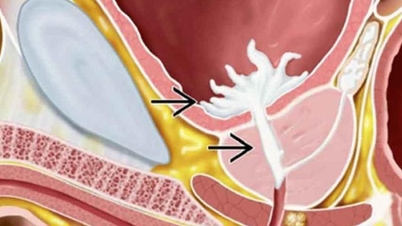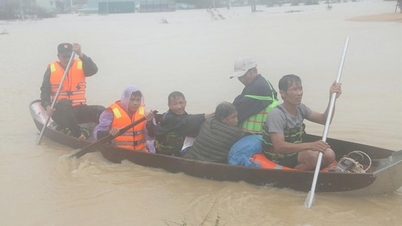NDO - When children show signs of high fever and respiratory tract infection, parents need to take their children to the nearest medical facility for examination and diagnosis.
Note symptoms that require hospitalization
According to Dr. Dang Thi Thuy, Head of the Department of Pediatrics, Central Hospital for Tropical Diseases, Influenza A is an acute respiratory infection that often occurs in winter-spring and when the seasons change (also known as seasonal flu). Influenza A can be caused by strains such as H1N1, H2N3, H7N9, etc.
The disease is spread through the respiratory tract through water particles and tiny droplets containing the virus released when a sick person coughs, sneezes, or through contact with objects or surfaces contaminated with the virus and then touching the eyes, nose, mouth, etc.
The initial symptoms of influenza A infection or seasonal flu in general and other respiratory viruses are similar. Children often have fever, inflammation of the respiratory tract (such as cough, sneezing, runny nose), sore throat, etc. Therefore, when children have these signs, parents often find it difficult to distinguish whether their child has influenza A or not.
In addition to the above initial symptoms, it should be noted that children infected with influenza A often have a high fever of 39-40 degrees Celsius, congested eyes, congested throat, redness all over, fatigue, poor appetite, fussiness, and in severe cases, difficulty breathing, pneumonia, bronchitis, etc.
When children show signs of high fever and respiratory tract infection as mentioned above, parents need to take their children to the nearest medical facility for examination and diagnosis, from which doctors will advise on appropriate care and treatment for each child's condition.
Most children with seasonal flu diagnosed with simple flu will be prescribed medication for outpatient treatment. Cases showing signs of respiratory tract infection complications such as bronchitis, pneumonia, bronchiolitis will be indicated for hospitalization.
According to Dr. Thuy, seasonal flu usually progresses benignly, but the disease can also have serious and dangerous complications that often occur in people with chronic cardiovascular and respiratory diseases.
Currently, there is a guideline for the diagnosis and treatment of seasonal flu from the Ministry of Health . The disease has specific treatment drugs and is indicated for specific cases. The guideline also guides symptomatic treatment measures and cases of seasonal flu with complications.
When children are sick, parents need to follow the doctor's instructions, give their children plenty of water, eat liquid and easily absorbed foods, take fever reducers, symptomatic medications (cough medicine, cold medicine to relieve nasal congestion), vitamins (especially vitamin C) to help increase resistance...
Note, the drugs used must be prescribed by a doctor, parents should not use them on their own.
How to prevent diseases for children
Dr. Dang Thi Thuy warns that influenza A is a highly contagious disease and anyone can get it, especially children, the elderly, and pregnant women.
The most effective way to prevent the disease is to get an active flu vaccine. The appropriate time to get vaccinated is about 3 months before the winter-spring transition (July-September every year) so that the body can produce the necessary antibodies to fight the virus. The flu virus is constantly changing, and after a year, the antibodies gradually decrease, so a booster shot should be given every year.
In addition, it is necessary to pay attention to improving children's health: giving children a nutritious diet, supplementing vitamins, minerals, and multivitamins according to their age...
Maintain personal hygiene such as washing hands with antibacterial soap or antiseptic solution before eating, when coming home from outside, after using the toilet. Limit touching eyes, nose, mouth. Regularly clean children's living and playing spaces, especially the classroom environment, toys, and objects children come into contact with every day...
This is a respiratory disease, so avoid bringing children to crowded places, especially contact with people with the flu. Wear a mask when going out to limit infection.
Source: https://nhandan.vn/nhung-dieu-cha-me-can-biet-de-phong-tranh-cum-a-cho-tre-post859096.html







































































































Comment (0)